Key takeaways
- Patreon allows musicians to build genuine connections with fans by offering exclusive content and fostering a community atmosphere.
- The platform provides reliable monthly income, enabling artists to focus on creativity without financial stress.
- Engaging fans through personal interactions, exclusive experiences, and transparency about goals enhances their emotional investment in the artist’s journey.
- Success on Patreon is measured by the quality of relationships and fan engagement rather than merely the number of patrons.
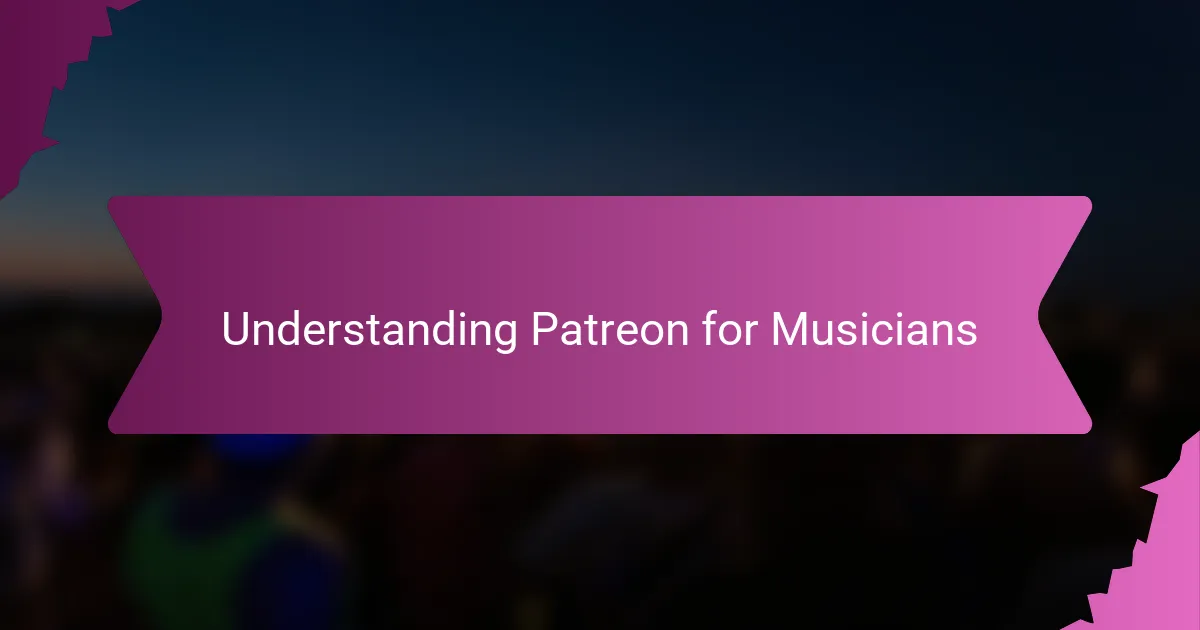
Understanding Patreon for Musicians
Patreon is a platform that lets musicians connect directly with their fans by offering exclusive content in exchange for monthly support. From my experience, this feels more like building a small community rather than just selling music. Have you ever wondered what it’s like to have fans who genuinely want to see you grow and succeed? Patreon makes that possible.
What I find fascinating is how Patreon shifts the relationship between artist and listener. Instead of the traditional one-way distribution, musicians can offer behind-the-scenes access, early releases, or even personalized content. This creates a sense of intimacy that’s hard to replicate on other platforms.
Of course, understanding Patreon means recognizing it requires commitment. It’s not just about posting content; it’s about nurturing relationships. When I started using it, I quickly learned that consistency and authenticity make all the difference. Without them, the engagement can feel transactional instead of meaningful.
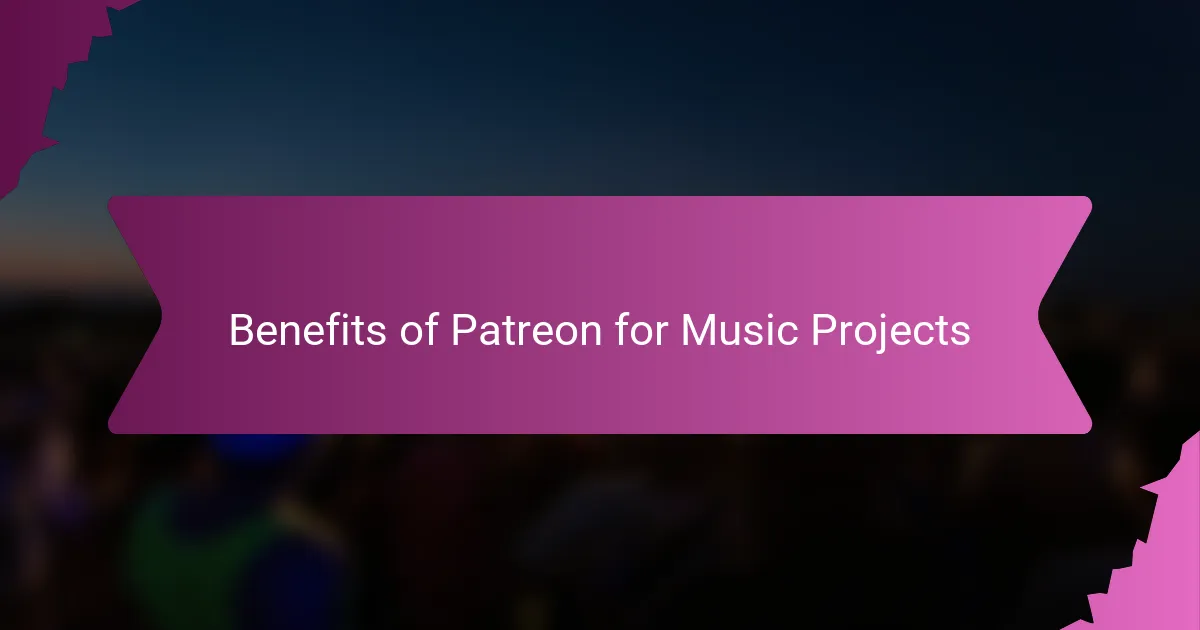
Benefits of Patreon for Music Projects
One of the biggest benefits I’ve found with Patreon is the steady income it provides. Unlike the unpredictable earnings from streaming services, Patreon offers a reliable monthly support system. This consistency allowed me to focus more on creating music rather than worrying constantly about finances.
Have you ever felt disconnected from your fans despite having thousands of followers? Patreon fixes that by fostering a genuine connection. In my experience, fans who support you here become part of your journey—they celebrate milestones with you and feel invested in your growth.
What really stands out to me is the creative freedom Patreon encourages. Since I’m not bound by traditional release schedules or commercial pressures, I can experiment and share music that’s authentic to me. It’s liberating to create knowing that my most loyal listeners are right there, appreciating the process every step of the way.
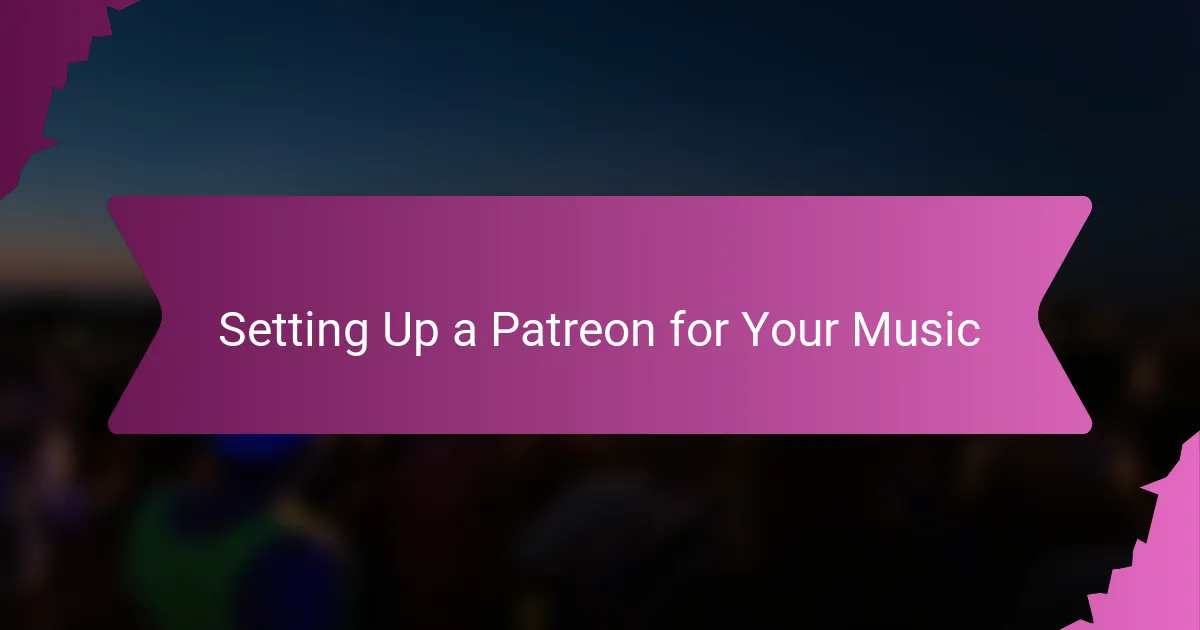
Setting Up a Patreon for Your Music
Setting up a Patreon for your music starts with defining the tiers and rewards that truly reflect what you can offer and what your fans might value. When I first mapped out my tiers, I asked myself, “What would I want as a fan?” Offering exclusive demos, early access to songs, or even monthly Q&A sessions helped me create meaningful options that feel personal and rewarding.
Another thing I realized early on is how important it is to make your Patreon page visually inviting. I spent time crafting a clear, friendly bio and uploading photos that tell my story. These small touches made fans feel like they were stepping into my world, not just subscribing to a generic service.
Finally, don’t underestimate the value of setting realistic goals and sharing them openly. I shared my dream of recording a new album, and every time I updated my patrons on progress, it sparked genuine excitement. Have you tried this? It’s amazing how transparent goals turn casual listeners into dedicated supporters.
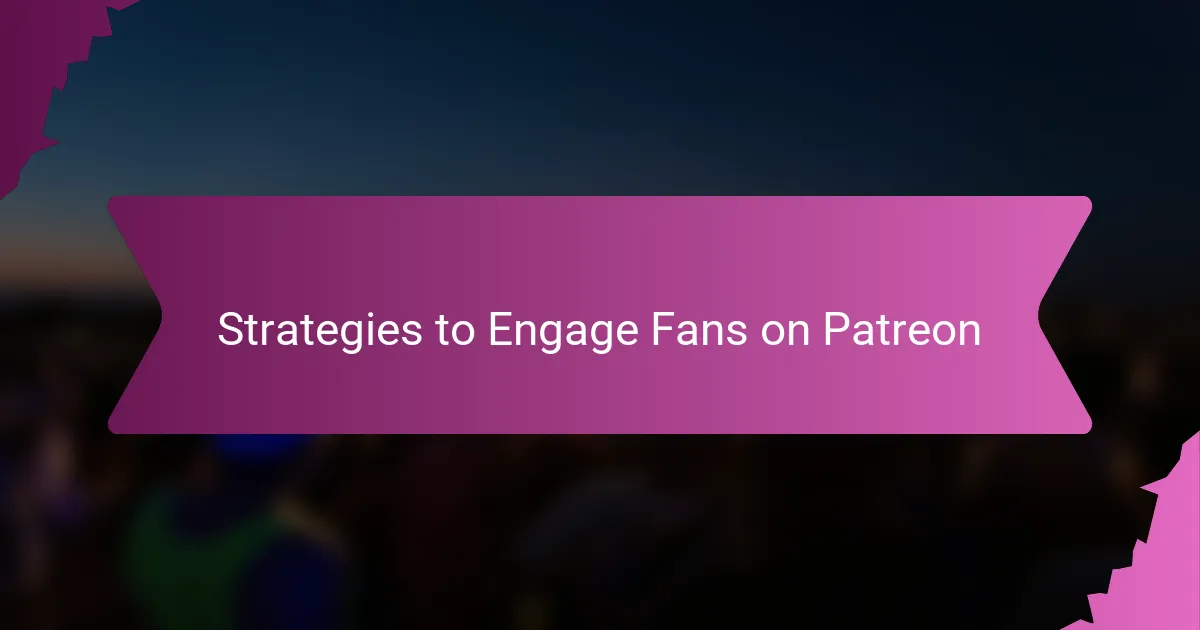
Strategies to Engage Fans on Patreon
Engaging fans on Patreon isn’t just about posting content regularly; it’s about creating moments that make them feel like insiders. I found that sharing raw, unpolished demos or asking for input on song ideas sparked conversations that went beyond simple likes or comments. Have you ever noticed how fans light up when they’re trusted to be part of the creative process?
Another strategy I swear by is exclusive experiences tailored to your community. When I scheduled live streams just for patrons, where I’d answer their questions or play requested songs, the connection deepened instantly. It’s those personalized touches that transform supporters into passionate advocates who stick around for the long haul.
Lastly, I’ve learned that consistency combined with authenticity keeps the momentum going. Posting irregular content feels like a tease, but showing up with genuine updates—even about struggles or setbacks—builds trust. Why hide the messy parts when being real actually draws fans closer? In my experience, honesty on Patreon is a powerful way to nurture lasting relationships.
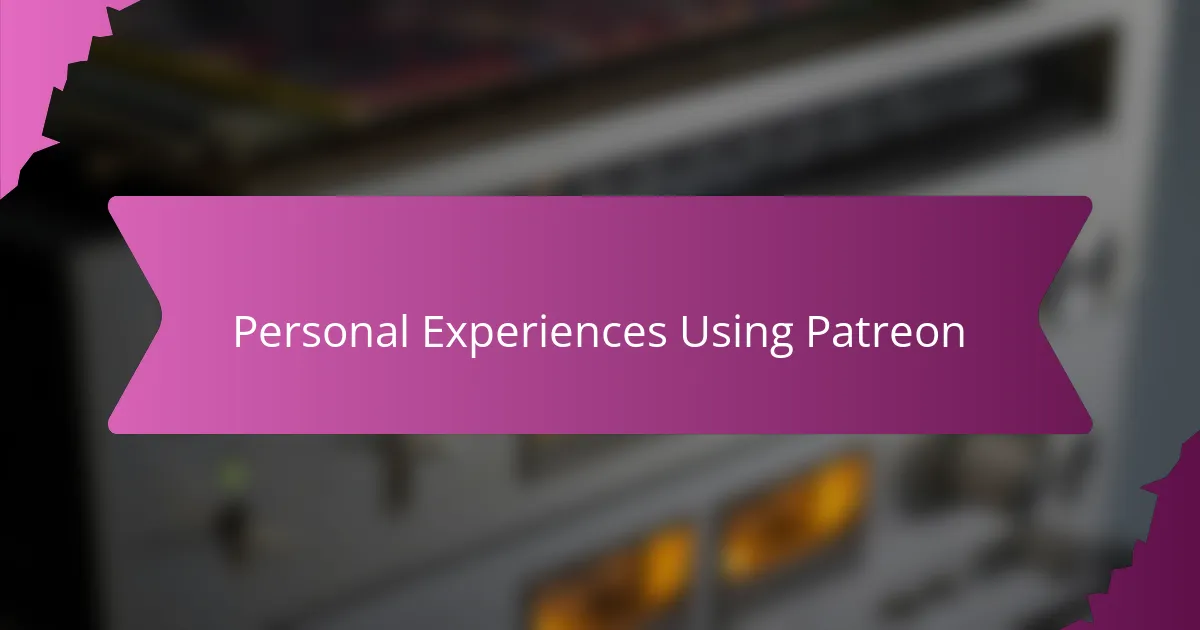
Personal Experiences Using Patreon
When I first launched my Patreon, I was honestly surprised by how quickly a core group of supporters emerged—people who weren’t just fans, but true collaborators in my musical journey. Have you ever experienced that moment when a stranger’s encouragement feels more motivating than a large crowd’s applause? That’s the kind of connection Patreon helped me build.
There were definitely challenges too. Early on, I underestimated the time it takes to keep patrons engaged with fresh, meaningful content. I remember feeling overwhelmed balancing creation and communication, but each personal message I sent was met with heartfelt responses, which made every effort worthwhile.
What strikes me most about my Patreon experience is how it transformed my perspective on fan interaction. Instead of seeing supporters as passive listeners, I began to view them as partners. This shift made the whole process feel more rewarding, both creatively and emotionally. Have you thought about how this kind of partnership might change your own music project?
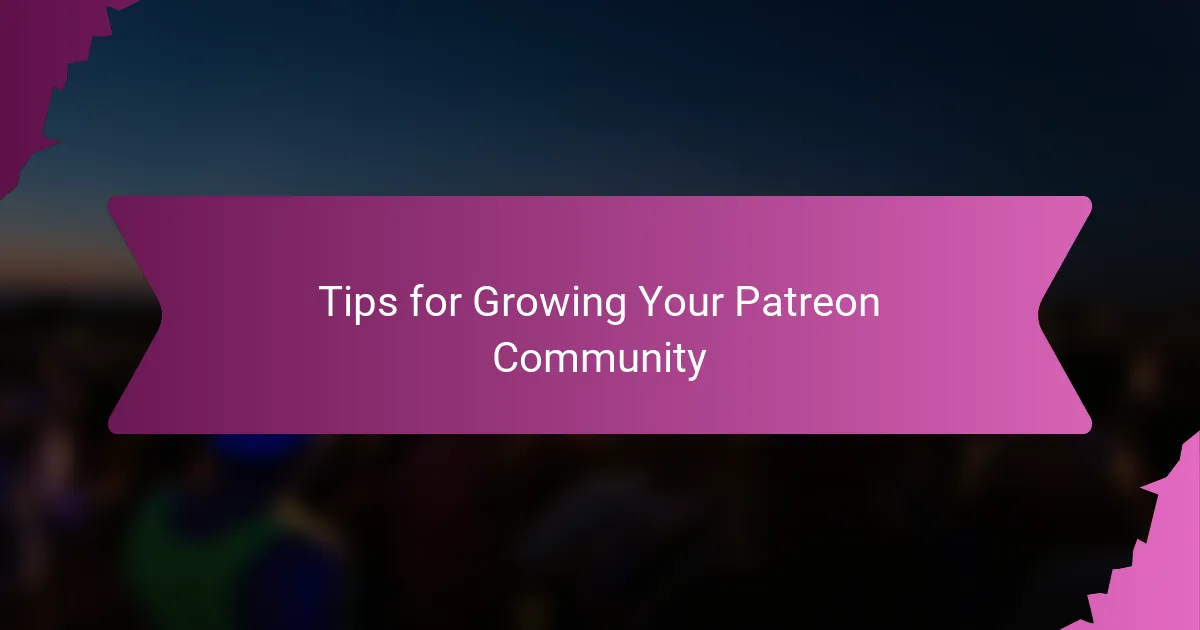
Tips for Growing Your Patreon Community
Growing your Patreon community starts with genuine connection. I’ve found that answering comments and messages personally not only makes fans feel seen but also encourages them to stick around and invite others. Have you ever noticed how a simple thank-you can turn a casual supporter into a passionate advocate? It’s those small gestures that multiply over time.
Another tip that worked wonders for me was offering exclusive, behind-the-scenes content that feels like a special peek into my creative process. Fans love knowing they’re part of something unique, and when I shared early demos or songwriting struggles, the response was overwhelmingly positive. What’s your story? Sharing it authentically can be the magnet that draws listeners closer.
Lastly, consistency is key, but so is flexibility. I learned this the hard way—posting irregularly made my patrons unsure if I was still active, while sticking to a schedule built trust. Yet, I remain flexible enough to pivot when inspiration strikes or life gets busy. How do you balance routine with spontaneity? Finding that sweet spot keeps your community engaged and eager for more.
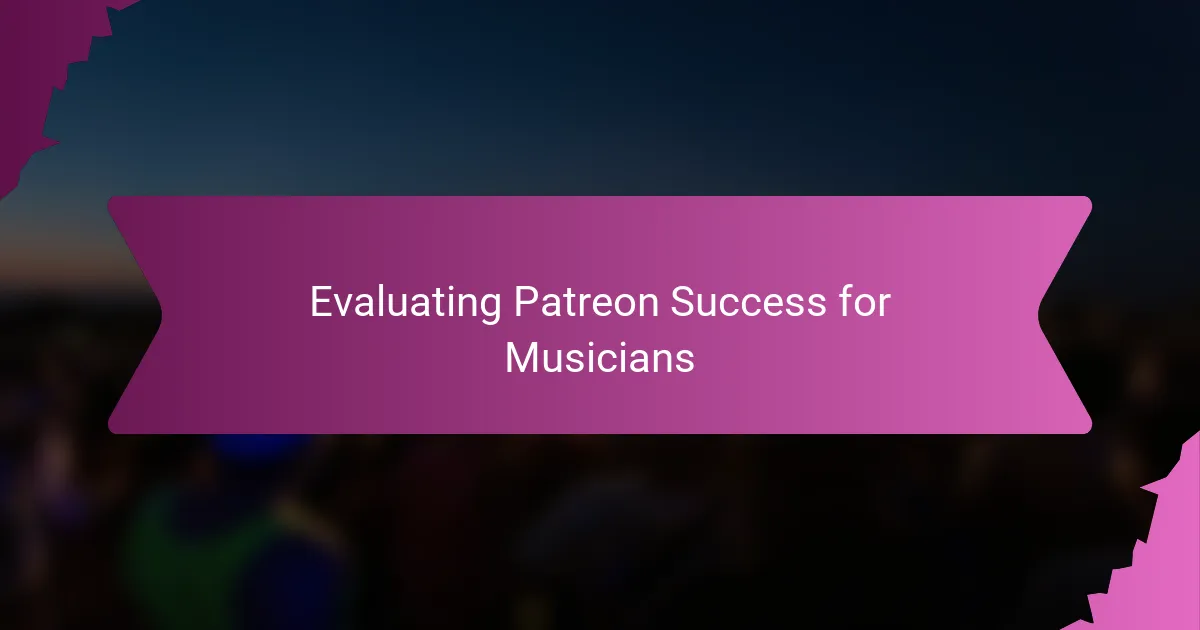
Evaluating Patreon Success for Musicians
Evaluating success on Patreon goes beyond just tracking numbers—it’s about understanding the quality of the relationship you build with your supporters. From my perspective, seeing steady growth in patrons is exciting, but what really matters is how engaged and invested those fans become over time. Have you noticed how interactions that go deeper than financial support often signal a healthier, more sustainable community?
I’ve found that the true measure of success often shows up in feedback and the willingness of patrons to participate in the creative process. When fans comment on early demos or respond eagerly to updates, it tells me I’m on the right path. It’s not just about the size of the audience but the level of connection maintained that keeps me motivated.
Another important indicator is goal achievement combined with transparency. Sharing clear milestones and openly discussing progress makes patrons feel like collaborators in the journey. When I noticed that updating supporters about recording an album sparked renewed engagement, it reinforced how success on Patreon ties directly to authentic storytelling and shared dreams. Have you tried incorporating this into your own Patreon strategy?